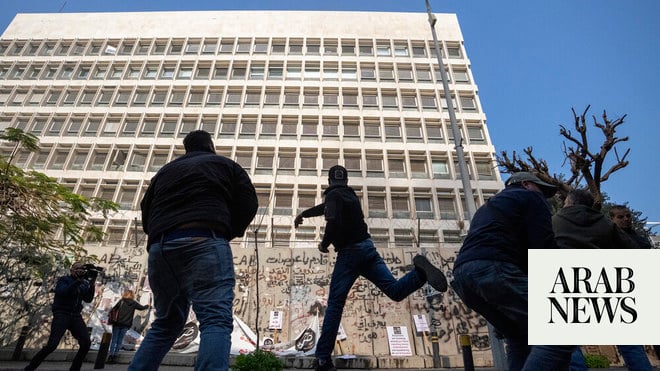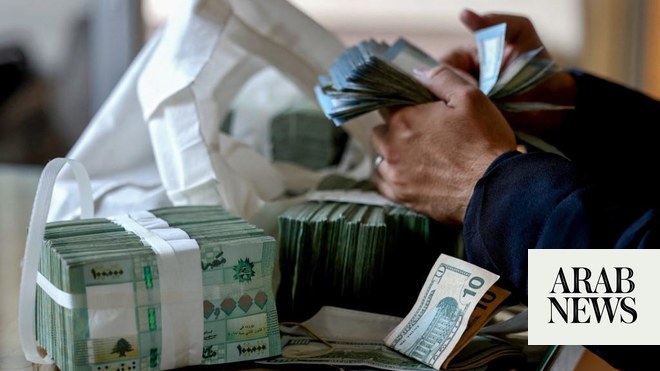
The Lebanese pound plunged to nearly 56,000 to the US dollar on the parallel market
As a result, the financial and commercial markets witnessed turmoil
BEIRUT: Lebanese protesters blocked roads and burned tires on Wednesday near the central bank in Beirut as the weakened local currency plummeted to a new low against the dollar.
The Lebanese pound, which had already lost more than 95 percent of its value since 2019, plunged to nearly 56,000 to the US dollar on the parallel market.
As a result, the financial and commercial markets witnessed turmoil.
The collapse in the value of the national currency prompted angry activists to take to the streets in areas in Beirut, southern Lebanon, Baalbek, Akkar, and in the vicinity of Palestinian refugee camps.
As the local currency has nosedived, fuel prices have soared, reaching about $18 for 20 liters of petrol.
The turmoil in the parallel market has prompted several sectors, including fuel stations, to close due to their inability to keep up with changing rates.
Fuel stations shut on Wednesday and the sector has called on the Ministry of Energy to issue a list of fuel prices in dollars, and to give citizens the option to pay in either Lebanese pounds or dollars, according to the current market price.
George Brax, a member of the owners of gas stations syndicate, told Arab News: “The fluctuation of the dollar exchange rate has created differences in the pricing of fuel, which prompted us to close our stations, but it is a temporary closure pending pricing in dollars.
“We buy fuel in dollars and sell in Lebanese pounds, and the stations’ stock has a value in dollars.”
Lebanese banks have imposed draconian restrictions on withdrawals since the country’s economic collapse three years ago, essentially denying people their savings and prompting public anger.
Protesters near the central bank headquarters labeled banks “thieves,” raising banners calling for “justice for depositors” and denouncing “the policy of the Governor of the Banque du Liban, Riad Salameh, and the banks.”
Salameh is currently being investigated on suspicion of financial misconduct, including money laundering and embezzlement.
Protesters demanded “to recover the deposits in full,” rejecting rules that allow them to withdraw $800 from their frozen cash, half of which is in dollars and the other half in Lebanese pounds.
One protester accused the state of being “a partner in ignoring the exhaustion of people who die at the gates of hospitals because they are unable to pay the cost of their hospitalization and buy medicine.”
New US sanctions were imposed on Lebanese money exchanger Hassan Moukalled and his two sons on Tuesday for links to Hezbollah.
Meanwhile, the US had announced $72 million in aid to Lebanon to cover security personnel salaries for six months, in a joint program with the UN.
Gen. Joseph Aoun, Lebanon’s army chief, said: “The international community’s keenness to preserve military institutions proves that it will not allow Lebanon to collapse on the security front.
“The impact and consequences of Lebanon’s collapse are not limited to it as a country, but will have an indirect impact on the regional security environment.”
Dorothy Shea, US ambassador to Lebanon, said: “This temporary support is to help the heroic soldiers and service members, while we are pressing the political leaders to elect a president of the republic, form a government and implement immediate economic reforms.”
Melanie Hoenstein, the resident representative of the UN Development Program in Lebanon, said: “Security, stability and rapid implementation of reform are the basic conditions for development in Lebanon, and transparency and accountability are essential for a project of this magnitude and importance.”












